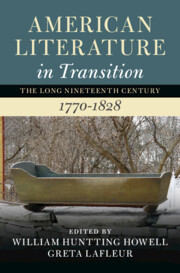Book contents
- American Literature in Transition, 1770–1828
- Nineteenth-Century American Literature In Transition
- American Literature in Transition, 1770–1828
- Copyright page
- Contents
- Contributors
- Series Preface
- Acknowledgments
- Chapter 1 Introduction
- Part I Form and Genre
- Chapter 2 The Law of Form and the Form of the Law
- Chapter 3 The Statesman’s Address
- Chapter 4 Vocabularies and Other Indigenous-Language Texts
- Chapter 5 The Genteel Novel in the Early United States
- Chapter 6 The State of Our Union
- Chapter 7 “To assume her Language as my own”
- Chapter 8 “Ambiguities and Little Secrets”
- Part II Networks
- Part III Methods for Living
- Index
Chapter 8 - “Ambiguities and Little Secrets”
Taste-Making and the Rise of the American Cookbook
from Part I - Form and Genre
Published online by Cambridge University Press: 09 June 2022
- American Literature in Transition, 1770–1828
- Nineteenth-Century American Literature In Transition
- American Literature in Transition, 1770–1828
- Copyright page
- Contents
- Contributors
- Series Preface
- Acknowledgments
- Chapter 1 Introduction
- Part I Form and Genre
- Chapter 2 The Law of Form and the Form of the Law
- Chapter 3 The Statesman’s Address
- Chapter 4 Vocabularies and Other Indigenous-Language Texts
- Chapter 5 The Genteel Novel in the Early United States
- Chapter 6 The State of Our Union
- Chapter 7 “To assume her Language as my own”
- Chapter 8 “Ambiguities and Little Secrets”
- Part II Networks
- Part III Methods for Living
- Index
Summary
This essay describes how the modern cookbook and recipe structure we know today emerges from its adolescent form in the early republic and argues that American notions of “good taste” are foregrounded in a transatlantic economic system. As a textual object, the cookbook functions in a number of registers: it creates a distinct American identity that is based on a value system; it equates eating with virtue and nation-building that develop notions of taste and taste-making; and it is predicated on a transatlantic system of production. Focusing on the ingredient list and accompanying paratextual elements of a recipe can illuminate a broader story of how slave labor in the Caribbean contributes to an early American culinary and cultural identity.
- Type
- Chapter
- Information
- American Literature in Transition, 1770–1828 , pp. 127 - 142Publisher: Cambridge University PressPrint publication year: 2022

